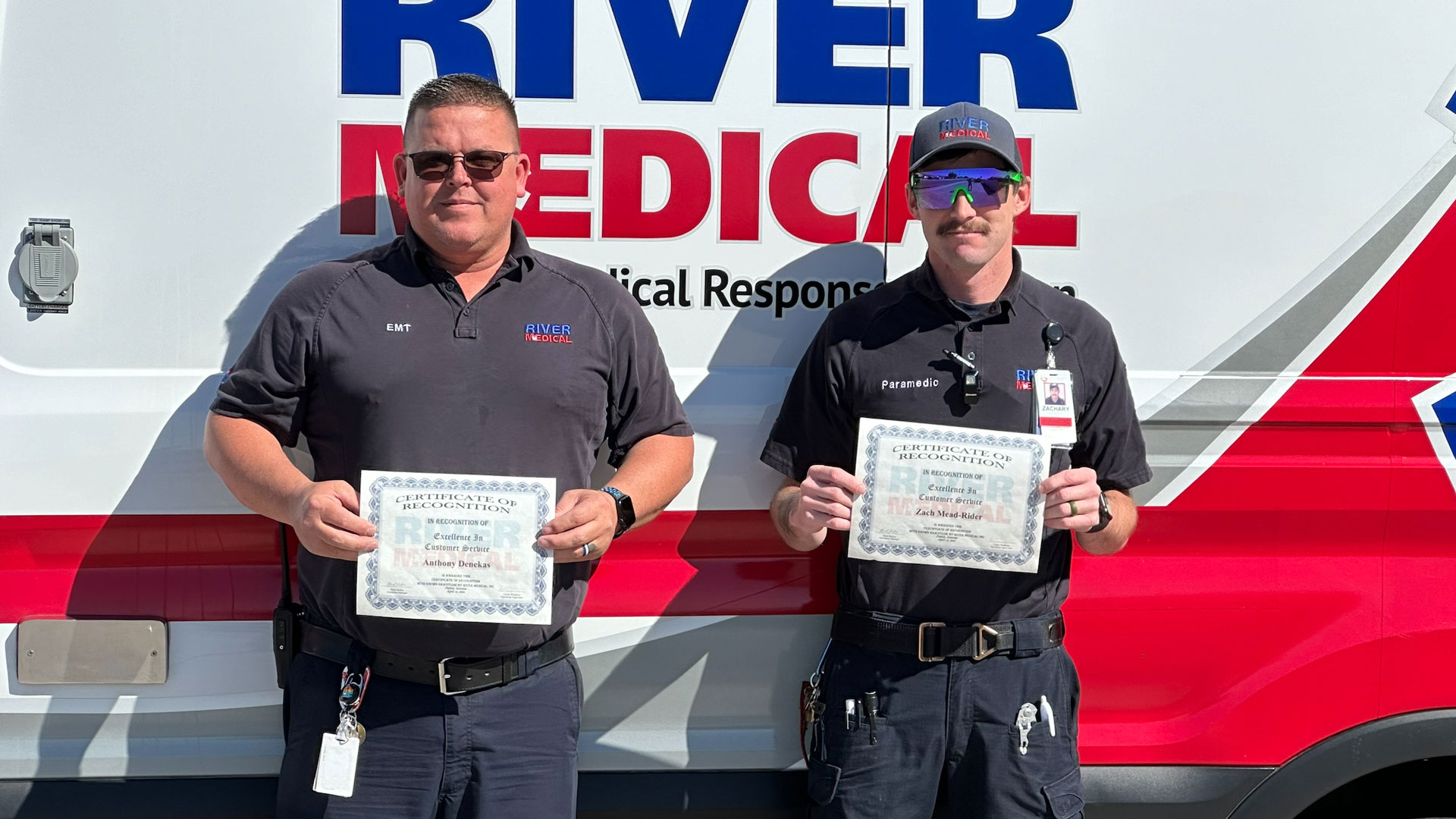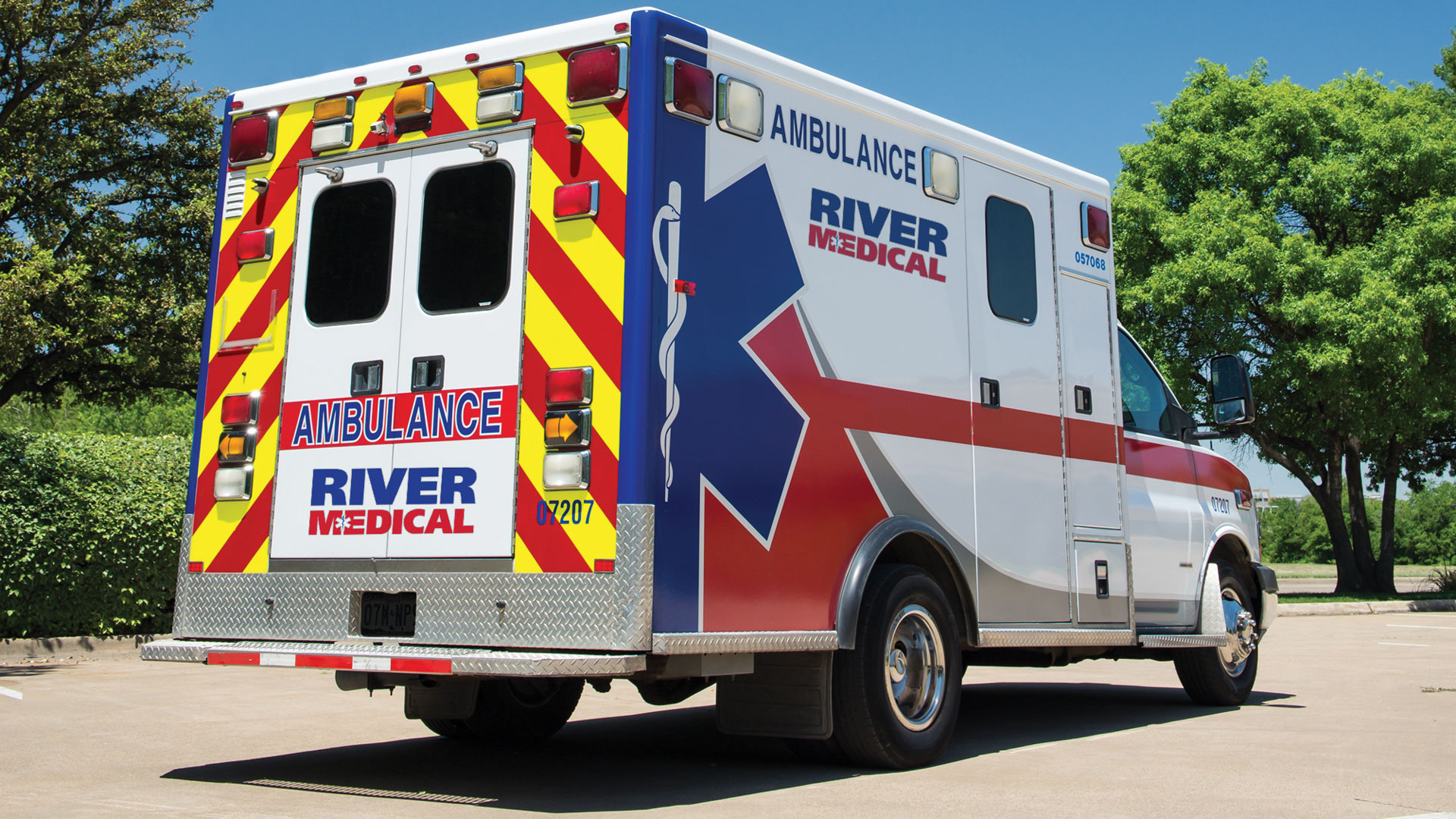The Patient in The Parking Lot
May 7, 2024
Arizona EMS professionals restore dignity and self-respect to a sick, unhoused patient.
While our mainstream culture may have become somewhat anesthetized to seeing people living on the streets in cities across our nation, the increase of unhoused people is not something EMS professionals can easily ignore. They see the crisis every day and often provide the only medical intervention that those without homes ever receive. Sometimes, that intervention comes in the form of a clinical procedure while other times it comes in the form of a simple act of compassion.
On an early morning in late March 2024, it was a “simple act of compassion” that made a major difference in the life of one unhoused patient who was in dire need of a non-judgmental helping hand.
It happened when Paramedic Zach Mead-Rider and EMT Tony Denekas of River Medical, an American Medical Response (AMR) company in La Paz, Arizona, responded to a call about a person, appearing to be in great pain and discomfort in a parking lot of a large retailer.
“When we arrived at the [unhoused] encampment, we could tell the patient was not only physically hurting but also emotionally distraught,” said Mead-Rider. “The individual seemed upset that they were being looked down upon because they were without a home.”
After briefly engaging with the patient, Mead-Rider and Denekas learned that the patient was suffering from severe diarrhea, resulting in soiled clothes. The patient had also just been treated at a local hospital and didn’t want to return there.
“The patient was in tears,” added Denekas. “The person really didn’t want anything; they were upset because they had a prescription from the hospital from their recent visit but didn’t have the money to fill it.”
Mead-Rider and Denekas then talked with crew members of the Colorado River Indian Tribe (CRIT) Fire Department, who had also arrived at the scene, to see if they could all chip in and help the patient.
“It was just about 6 a.m., and we knew the store would open shortly,” said Mead-Rider. “So, we decided that while the CRIT crew covered the cost for the prescription, we [Denekas and I] could go in and buy the patient a few toiletries, food, new clothing items and dehydration drinks, like Pedialyte.”
What came next would surprise everyone.
“When we gave the items and prescription to the patient, I immediately saw an attitude change,” recalled Mead-Rider. “The patient’s facial expression went from despair to hopeful; I think the patient didn’t believe that we were going to give them this help, and then, when they saw that we did, the individual suddenly felt things were going to change; things were going to get better.”
And the patient did get better.
“After the individual received the medication and other items, there was definitely an improvement,” said Mead-Rider.
“This person was different than most we see on the streets,” added Denekas. “The individual didn’t appear to be dazed or under the influence of any substances, but rather someone who just needed a little help. They weren’t asking for money to buy drugs or alcohol; they just needed help in getting their prescription filled.”
Mead-Rider and Denekas say that while it’s easy to put people in categories — something everyone does from time to time — it’s important to allow a little “wiggle room” for doubt, which often opens the door for greater understanding, kindness and grace.
“I come from a family that puts the needs of others first,” said Denekas. “My wife runs her own non-profit and her father is a former Marine, so I’m surrounded by people who care about people. In this case and many others like it, it’s important to take a good look at someone and listen to them before reaching your own conclusion.”
Mead-Rider agrees.
“I really felt for this person,” he said. “I can’t imagine having an ailment and not being able to treat it. I was blessed growing up in a family that taught me to help those in need, which is partly why I went into the EMS profession in the first place. To me, patient care is patient care, whether that patient is in a palace, pavilion or, in this case, a parking lot. Everyone deserves human respect, dignity and care.”
On an early morning in late March 2024, it was a “simple act of compassion” that made a major difference in the life of one unhoused patient who was in dire need of a non-judgmental helping hand.
It happened when Paramedic Zach Mead-Rider and EMT Tony Denekas of River Medical, an American Medical Response (AMR) company in La Paz, Arizona, responded to a call about a person, appearing to be in great pain and discomfort in a parking lot of a large retailer.
“When we arrived at the [unhoused] encampment, we could tell the patient was not only physically hurting but also emotionally distraught,” said Mead-Rider. “The individual seemed upset that they were being looked down upon because they were without a home.”
After briefly engaging with the patient, Mead-Rider and Denekas learned that the patient was suffering from severe diarrhea, resulting in soiled clothes. The patient had also just been treated at a local hospital and didn’t want to return there.
“The patient was in tears,” added Denekas. “The person really didn’t want anything; they were upset because they had a prescription from the hospital from their recent visit but didn’t have the money to fill it.”
Mead-Rider and Denekas then talked with crew members of the Colorado River Indian Tribe (CRIT) Fire Department, who had also arrived at the scene, to see if they could all chip in and help the patient.
“It was just about 6 a.m., and we knew the store would open shortly,” said Mead-Rider. “So, we decided that while the CRIT crew covered the cost for the prescription, we [Denekas and I] could go in and buy the patient a few toiletries, food, new clothing items and dehydration drinks, like Pedialyte.”
What came next would surprise everyone.
“When we gave the items and prescription to the patient, I immediately saw an attitude change,” recalled Mead-Rider. “The patient’s facial expression went from despair to hopeful; I think the patient didn’t believe that we were going to give them this help, and then, when they saw that we did, the individual suddenly felt things were going to change; things were going to get better.”
And the patient did get better.
“After the individual received the medication and other items, there was definitely an improvement,” said Mead-Rider.
“This person was different than most we see on the streets,” added Denekas. “The individual didn’t appear to be dazed or under the influence of any substances, but rather someone who just needed a little help. They weren’t asking for money to buy drugs or alcohol; they just needed help in getting their prescription filled.”
Mead-Rider and Denekas say that while it’s easy to put people in categories — something everyone does from time to time — it’s important to allow a little “wiggle room” for doubt, which often opens the door for greater understanding, kindness and grace.
“I come from a family that puts the needs of others first,” said Denekas. “My wife runs her own non-profit and her father is a former Marine, so I’m surrounded by people who care about people. In this case and many others like it, it’s important to take a good look at someone and listen to them before reaching your own conclusion.”
Mead-Rider agrees.
“I really felt for this person,” he said. “I can’t imagine having an ailment and not being able to treat it. I was blessed growing up in a family that taught me to help those in need, which is partly why I went into the EMS profession in the first place. To me, patient care is patient care, whether that patient is in a palace, pavilion or, in this case, a parking lot. Everyone deserves human respect, dignity and care.”


